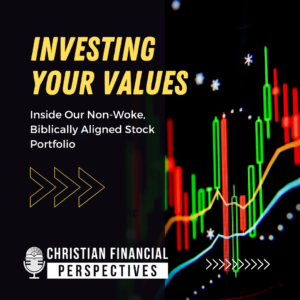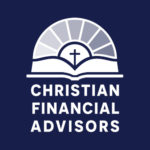Click below to listen to Episode 191 – Investing Your Values: Inside Our Non-Woke, Biblically Aligned Stock Portfolio
Subscribe: Apple Podcasts | Google Podcasts | Spotify | Amazon Music | Stitcher | RSS | More
Investing Your Values: Inside Our Non-Woke, Biblically Aligned Stock Portfolio

Learn how we choose and filter out companies for our actively managed, Biblically responsible investment portfolio.

Tired of “woke” companies that don’t align with your values? Eager to invest in a diversified stock portfolio that targets growth while honoring Biblical principles? You’re in the right place!
In this can’t-miss episode, Bob and Shawn pull back the curtain on our innovative Biblically responsible, non-woke, deep value stock portfolio. Get ready for an in-depth look at our rigorous stock selection process, which carefully evaluates both financial fundamentals and spiritual alignment.
Click here to learn more about our Biblical Responsible Stock Portfolio
HOSTED BY: Bob Barber, CWS®, CKA®
CO-HOST: Shawn Peters
Mentioned In This Episode
Bible Verses In This Episode
PROVERBS 27:23
Know well the condition of your flock, and pay attention to your herds.
ECCLESIASTES 11:2
Give a portion to seven or even to eight, for you don’t know what disaster may happen on earth.
PROVERBS 13:11
Wealth obtained by fraud will dwindle, but whoever earns it through labor will multiply it.
Want to ask a question about your specific situation? Schedule a complimentary 15 minute phone call.
EPISODE TRANSCRIPT
Shawn:
Seeking a diversified stock portfolio aligned with Biblical values? Want to avoid woke companies while still targeting growth? Stay tuned for our Biblically Responsible Stocks portfolio. Let’s get some perspective. Welcome to another episode of Christian Financial Perspectives. My name’s Shawn Peters. I’m joined as always by my co-host, Bob Barber, and today we’re going to be covering our Biblically responsible non-work deep value, actively managed stock portfolio. I’m not going to say it five times fast, Bob.
Bob:
I know that’s kind of a hard one to get out there. Lemme say it, too. Okay. Our Biblically responsible, non woke, deep valued, actively managed, stock portfolio. You’re right, you can’t say that 10 times real fast.
Shawn:
And you can only get this through Christian Financial Advisors. So before we get into it, we are going to cover exactly what we go through to create this model to this portfolio, how we maintain it, things like that. But I want to share a few scriptures on this. First we have Proverbs 27:23, “Know well the condition of your flock and pay attention to your herds.”
Bob:
I think that’s a good one, Shawn, that you picked, too.
Shawn:
And this next one, I know you love Bob. You want to read that one?
Bob:
Well, yes, that’s one of my favorites. Ecclesiastes 11:2, “Give a portion to seven or even to eight for you do not know what disaster may happen on earth.”
Shawn:
It’s a good one for diversification.
Bob:
I think it’s one of the most important investing scriptures in the Bible.
Shawn:
And Proverbs 13:11, “Wealth obtained by fraud will dwindle, but whoever earns it through labor will multiply it.” So the model we’re going to be covering today, or the portfolio, we use within our risk target managed models, we use 50% of the equity in a number of those portfolios. 50% of that, of those equity positions, are managed in the same way. So the same portfolio, whether it’s on its own in a single individual account or if we’re talking about our target risk manage models, we use 50% of the equity in the same way.
Bob:
We’re bringing this to you today because we want you to understand that this is a portfolio you can have that would compliment something you may be already doing on your own that’s Biblically responsible and again, non woke. And basically, this is an introduction of this portfolio to the public that any of you can get with a minimum investment of $50,000.
Shawn:
Per account. So what we do first and foremost is we start our selection process with the US stock market covering the NASDAQ and the New York Stock Exchange. So there’s over 11,000, I think the exact total is 11,500 something. So we’ll say 11,000, but there’s over 11,000 companies to choose from. And we eventually funnel all of those down to 100 to 200 kind of range. So maybe a few hundred.
Bob:
So basically we funnel out about 98% of them.
Shawn:
A lot. Yeah. So we do this based on a financial value score, fundamental score, as well as we’re looking across and trying to whittle things down to the 12 sectors that’s representative of the market. So first thing we do for the value scores, we have 10 litmus tests that are assigned for the value categories such as earnings yield, book value compared to equity, overall profits of the company, cashflow, assets, liabilities, sales, et cetera. There’s a lot that goes into that. But out of these 10 tests and scores, these categories help us to locate companies that are selling for a low price relative to their benefit or some might say their intrinsic value. So what they should be worth based on historical multiples and all these other categories that go into it. Long story short, they’re on sale is how you could look at that.
Bob:
Exactly. And so after we look at the values then, and there’s like I say, there’s 10 different tests there.
Shawn:
And they have to pass at least 8 out of the 10 to even be considered for the portfolio.
Bob:
Right. That’s correct. Then we look at the fundamentals of the companies.
Shawn:
Another 10 tests.
Bob:
It’s another 10 tests that we assign for the fundamentals, litmus tests, as we call it. We look at things like earnings per share, revenue growth, amount of long-term debt, price of companies, stock to the earnings ratio, that’s called a PE ratio. And all these companies, again, must pass at least 8 of 10 of the litmus tests that we assigned to it for the fundamentals. So when we’re applying all these tests, they’ve got to score 80 or above, like you say, that knocks out 98% of the entire market.
Shawn:
So what’s left of the 11,000? Well, we kind of alluded to – presently as of recording, we only have about 1-2% left. So it ends up being around 125 to 150 that actually pass 8 out of 10 or more of both the value scoring and the fundamental scoring litmus test. So this, again, as I mentioned earlier, it does include the NASDAQ and the s and p 500. And from there we now go to our next to last, well, our last screening, but our next to last step if you will. So the last screening process allows us to whittle this list down even further to those that pass our Biblically responsible tests. That way we exclude the woke companies, companies that are not aligned with our values as Christians. And most companies that we’re talking about here, they’re not Christian companies, they’re just companies that, if anything, you could argue that they’re neutral, not really getting involved in either way on some of these key issues. Well,
Bob:
There are companies that are doing what they’re supposed to do if the company makes widgets, they should make widgets. They don’t need to be involved
Shawn:
In
Bob:
Politics, in politics and all of these other areas. So it does get down to the pure companies,
Shawn:
Right? So after applying this, I mean we’ve already gone from over 11,000, now we’re down to 125 to 150. So we’re going to whittle that down a little bit further and we screen out companies that have involvement in manufacturer sale or distribution of pornography, the production or sale of either alcoholic beverages or tobacco products. There are companies that are involved in gambling, abortion, human rights violations, or LGBT activism. I’m not going to name all the letters. There’s too many letters at this point. You get what I mean. So it narrows this down typically to around, say 100 to 120 companies just depending on what we originally started with. So the final part of this is that we narrow down the list even more because the most recent scans that we did, Bob, we had a significant number of companies that passed all the litmus tests, but if we just took from a market cap standpoint, we would’ve been heavily overweighted in regional banks within the financials just because of what had been going on with the regional banks. So this last step is very important because we want to look at the market cap and the sector of each company. So we group the companies across the 11 to 12 sectors.
Bob:
This is where we truly apply the Ecclesiastes scripture to it that says, “Give your portion to seven or eight because you do not know what disaster may come upon the land.” And so what we’re doing here is there’s 12 sectors of the market and we don’t want to invest more than 12% to 15% in any one sector because when you take that scripture and divide that into 100, that’s where you come up with 12-15%.
Shawn:
So that’s the goal. It may fluctuate a little bit. Sometimes we might be a little closer to 18-19% and a little bit lower in another sector. Just kind of depends on what actually passed all the criteria. But the goal is we’re trying to stick right around that 12-15% because we’re narrowing this down to our 50 finalists or for the portfolio. And so, then once we narrow that down and we try to spread the potential positions out as much as possible across the available sectors…
Bob:
We equally weight.
Shawn:
We then equally weight. Exactly. So we use market cap to help us find at least larger companies. We don’t want to be putting too much money into a company that can’t handle the volume. And so that’s why we do – once after we’ve done the market cap, that’s why we do the equal weighting because again, we’re not looking at putting 20% or 30% all in one particular sector. That usually gets us around what, three to four companies in each sector for the portfolio? And this gives us…
Bob:
Which is going to be, again, 50 stocks.
Shawn:
And this gives us our 50 finalists of the most deep valued, fundamentally sound, Biblically responsible, non-woke stocks that we can find in the markets.
Bob:
You did good there.
Shawn:
We do this step to avoid the overweighting, like we mentioned, to avoid the overweighting into any one sector and thereby reduce the systematic risk for that particular sector. So a good example, if we were not applying this and we just took more of a market cap approach, we might end up heavily weighted in the regional banks. Well then if more bad news came out about the regional banks, it would really hurt the portfolio if we had way too much and overweight in that area. So, once a quarter we repeat this whole process for the portfolio. However, we do monitor daily when the markets are open to make sure there haven’t been any major changes in the overall metrics that require a sell. So a good example of that might be, originally a company made it in, they made it into the 50 finalists, but if they go from an 8 out of 10 on the fundamental score and all of a sudden they’re at a 5 or 6 out of 10 because some stuff happens, some structural changes.
Bob:
That may be a good thing because the company might have increased their value by 30% or something and now they’re no longer a deep value company. Because remember, this is a deep value portfolio. This is not considered a high growth portfolio. It’s a value portfolio. So you can compliment it with a growth side of it.
Shawn:
So if the value score changed from 8 or 9 out of 10 down to like 5 or 6, then Bob is exactly right that it wouldn’t necessarily mean we want to liquidate it immediately. On the fundamental score, if that changed, that could, again, not a guarantee, but it could indicate a problem with the company. And so if we ever see something come up like that, we look a little further just because all of a sudden it didn’t pass as many tests we want to liquidate, but it is a, “Hey! Red flag! We need to go look into this a little further, see what’s going on.” Is this a temporary cashflow kind of thing? What’s going on exactly. But that’s something that we monitor on a regular basis and try to mitigate that risk.
Bob:
You know how I love markets, so I’m watching this portfolio at least six to eight times a day. That much. And just to see…
Shawn:
So you don’t have to.
Bob:
Yeah, well I don’t think most people want to go to the process either of this process of looking at 11,000 stocks and going through all of this funneling process, getting down to the most fundamentally, deep value, non-woke, Biblically responsible stocks in the entire market. But we’re introducing this today to where if you would like to get into this portfolio with a minimum investment of $50,000 per account, you’ve got that opportunity and you could compliment…
Shawn:
Visit our website, give us a call, text us.
Bob:
And this can compliment. We do want to point out one thing that this is 100% stocks, this, so this is considered a growth portfolio. Anytime you have 100% stocks of anything, it’s considered growth.
Shawn:
That’s right. But since this is all individual stocks and it’s 50, it would definitely be on the higher end. So, I think a good example would be – it’s just general rule of thumb – if you’re hearing this and it sounds interesting, but you’re not comfortable with seeing your account value drop 20% or more in a six month time period, this is probably not for you. Again, we think a really good strategy, but it does carry a lot more volatility and risk than your average managed portfolio.
Bob:
It could do the same thing on the other side. Okay. Absolutely. And we’ve seen that before, but always future performance is no guarantee based on past performance.
Shawn:
Exactly. Yeah. Insert disclaimer here, right? Yeah.
Bob:
If you would like more information about this, you can call or text us during business hours at (830) 609-6986, or you can go to our website right from there and you can set up an appointment with one of us here at the office. Go to www.ChristianFinancialAdvisors.com.
Shawn:
That’s right. That’s it. Thank you for joining us. God bless. Until next time.
[DISCLOSURES]
* Investment advisory services offered through Christian Investment Advisors Inc dba Christian Financial Advisors, a registered investment advisor registered with the SEC. Registration as an investment advisor does not imply a certain level of skill or training. Comments from today’s show are for informational purposes only and not to be considered investment advice or recommendations to buy or sell any company that may have been mentioned or discussed. The opinions expressed are solely those of the hosts, Bob Barber and Shawn Peters, and their guests. Bob and Shawn do not provide tax advice and encourage you to seek guidance from a tax professional. While Christian Financial Advisors believes the information to be accurate and reliable, we do not claim or have responsibility for its completeness, accuracy, or reliability.









